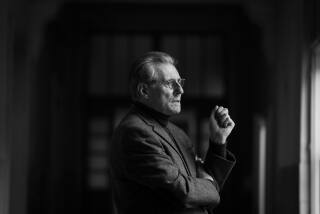MOVIE REVIEW : RIGID EMOTIONS AT CORE OF ‘WETHERBY’
- Share via
In the darkly brilliant “Wetherby” (at the Fine Arts), the name of an actual Yorkshire village, writer-director David Hare is more interested in illuminating a state of mind rather than a place. He does so with precision--and with unexpected reverberations.
How well he disarms us. Here’s Vanessa Redgrave, patrician and smiling, and Ian Holm, equally benign, settling down to some civilized, softly accented conversation in an old pub that couldn’t possibly be more inviting. Everything is so wonderfully burnished : the talk, the handsome, healthy glow of the actors, the gracious setting. This warm mood later expands with the addition of several more attractive people at a dinner party at Redgrave’s fine old farmhouse.
“Wetherby” looks to be one of those films in which whatever it has on its mind will surface when it jolly well feels like it; in the meantime we can enjoy its adult good company. Yet we’re only 12 minutes into this quietly stunning work when one of Redgrave’s guests, a young man (Tim McInnerny), involves her in a terrible act of violence.
In that instant we’re shifted, in Redgrave’s memory, 30 years into the past, where we meet the teen-aged Redgrave (played by her own talented, look-alike daughter, Joely Richardson). She has fallen in love with a nice young serviceman (Robert Hines), soon to be off on a lengthy tour of duty in Malaya. In cross-cutting between past and present, eventually connecting the fates of McInnerny and Hines, Hare cuts to the core of the English character, not just that of Redgrave’s spinster schoolteacher.
The first of his revelations is that nobody actually knew McInnerny, who turns out to have been a graduate student doing research at a Wetherby library. Redgrave assumes he’s come to her party with Holm and Holm’s wife (Judi Dench); Dench, a librarian who recognizes the young man as someone she got a book for, assumes that Redgrave is also acquainted with him. Why was McInnerny drawn to Redgrave, whom he didn’t know, instead of her? wonders Dench. “I think the lonely recognize the lonely,” replies Redgrave.
Hare gradually leads us to understand McInnerny’s shocking act through its impact upon Redgrave, confronting her as it does with her past as well as her present. Redgrave is the very picture of solitary contentment, an exemplary teacher who can relate to her pupils and inspire them, yet how very clenched she proves beneath that calm, confident surface. And how lost for words she is when challenged by a student (Stephanie Noblett) questioning the value of an education in today’s world.
Then there’s the young woman (Suzanna Hamilton) who turns up at Redgrave’s house and admits that she rejected McInnerny. And finally, a policeman (Mike Langdon) who, understanding Redgrave better than she does herself, divines the truth about what led McInnerny to his grievous act.
What concerns Hare most is crippling emotional reticence, often disastrous in consequence, yet so deeply ingrained in the English character as to be unshakable. We later learn that at Redgrave’s dinner McInnerny had spoken out in favor of the old words like “goodness, revenge and desire,” whose meanings don’t have to be defined, and had cursed the repression of feelings created by “the modern apparatus of words” that dilutes and debases meaning and passion.
“Wetherby” reveals writer-director Hare, best known as the author of the play “Plenty” (soon to be seen as a film with Meryl Streep), to be at one with his characters, for as a film maker, his work is as thoroughly controlled as the people he observes. Everyone is dauntingly articulate, never failing to give just the right turn, the right intonation, to every phrase. Yet Hare, in his theatrical feature directorial debut, is sufficiently detached to allow his film to stand as a comment on the rigid emotional discipline that is so valued in the world of his characters.
At the same time Hare is not judgmental, which allows his exemplary cast to become living, breathing people in whom we just might recognize something of ourselves. Indeed, the lovely, intelligent, desirable yet deeply knotted woman Vanessa Redgrave plays in “Wetherby” ranks with her “Isadora,” “Julia” and Olive Chancellor in “The Bostonians.” Arriving as it does on the heels of “Dance With a Stranger,” “Wetherby” (rated R for adult situations) gives fresh hope for a revived British cinema.
‘WETHERBY’ An MGM/UA Classics release. Producer Simon Relph. Writer-director David Hare. Camera Stuart Harris. Music Nick Bicat. Associate producer Patsy Pollock. Production designer Hayden Griffin. Costumes Jane Greenwood. Film editor Chris Wimble. With Vanessa Redgrave, Tim McInnerny, Ian Holm, Judi Dench, Joely Richardson, Robert Hines, Marjorie Yates, Tom Wilkinson, Suzanna Hamilton, Stuart Wilson, Diane Whitley.
Running time: 1 hour, 42 minutes.
MPAA-rated: R (those under 17 must be accompanied by parent or adult guardian).
More to Read
Only good movies
Get the Indie Focus newsletter, Mark Olsen's weekly guide to the world of cinema.
You may occasionally receive promotional content from the Los Angeles Times.









